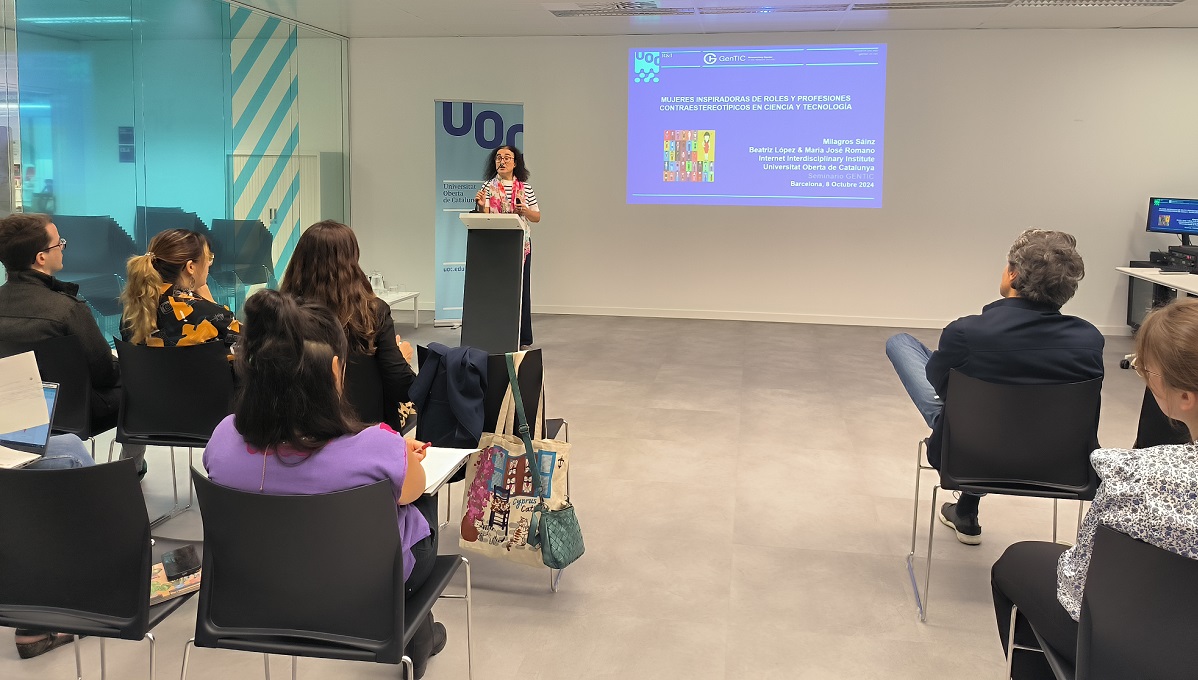On Tuesday 8 October, the GenTIC Research Seminar “Feminist Intersectional Perspectives on Gender Inequalities, Power Relations, and Well-being in the Digital Age” took place. For the second year, the GenTIC team organised this event as an open space to discuss the results of their research lines and to share ongoing activities and projects with students, researchers, educators and anyone interested in addressing gender inequalities and other current challenges of the digital society from a feminist intersectional perspective.
The first part of the seminar was moderated by Mónica Grau, a visiting postdoctoral researcher at GenTIC. The director of GenTIC, Milagros Sáinz, welcomed the participants and presented a communication on the impact of exposure to female role models in STEM fields to inspire counter-stereotypical gender roles and increase interest in scientific and technological studies among high school students. This research is part of the HORIGESTEM project, funded by the Ministry of Science, Innovation and Universities, and was led by Milagros Sáinz as principal investigator, with the collaboration of Beatriz López and María José Romano as research assistants. In her presentation, Milagros Sáinz highlighted the different effects of interventions with female role models in STEM on girls’ and boys’ attitudes towards science and technology. The activities based on female role models also had an impact on the importance students attached to different values associated with professional activities, such as altruism, money, family and power, and on their interest in tasks related to diverse fields of knowledge, such as humanities, social sciences, health sciences and technology. Milagros Sáinz concluded that these research findings suggest the need for further studies with female role models in science and technology in which the effects of communal aspects between boys and girls are controlled.
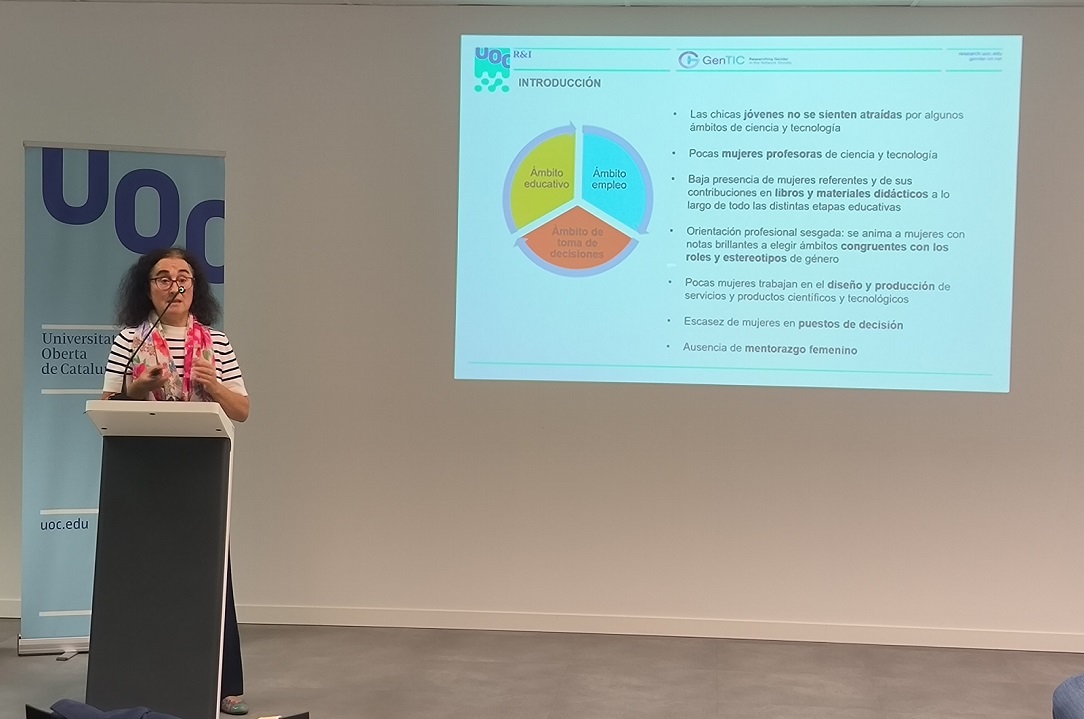
Milagros Sáinz, director of GenTIC and principal investigator of the HORIGESTEM project.
Rocío Segura, a predoctoral researcher at GenTIC and a member of the Psychology of Social Change Lab at the University of Granada, shared the results of a study, also linked to the HORIGESTEM project, that explores attitudes towards toys and gender roles in childhood. Rocío Segura presented two studies that involved groups of children aged 5-6 and 7-10. The results showed that positive attitudes towards a type of toy are associated with career aspirations and attitudes towards domestic tasks that are linked to gender roles and stereotypes. The rigidity of stereotypical attitudes is greater at younger ages towards male-dominated occupations, while at older ages there is greater rigidity towards female-dominated occupations, indicating a greater resistance among boys to integrate into occupations associated with female roles. Rocío Segura emphasised the importance of promoting counter-stereotypical play among children to develop skills, encourage play between children of different genders, and raise aspirations for careers and domestic tasks beyond gender stereotypes. “Teachers and the educational context play an important role in reinforcing or modulating the impact of the family environment on gender equality issues,” she noted.
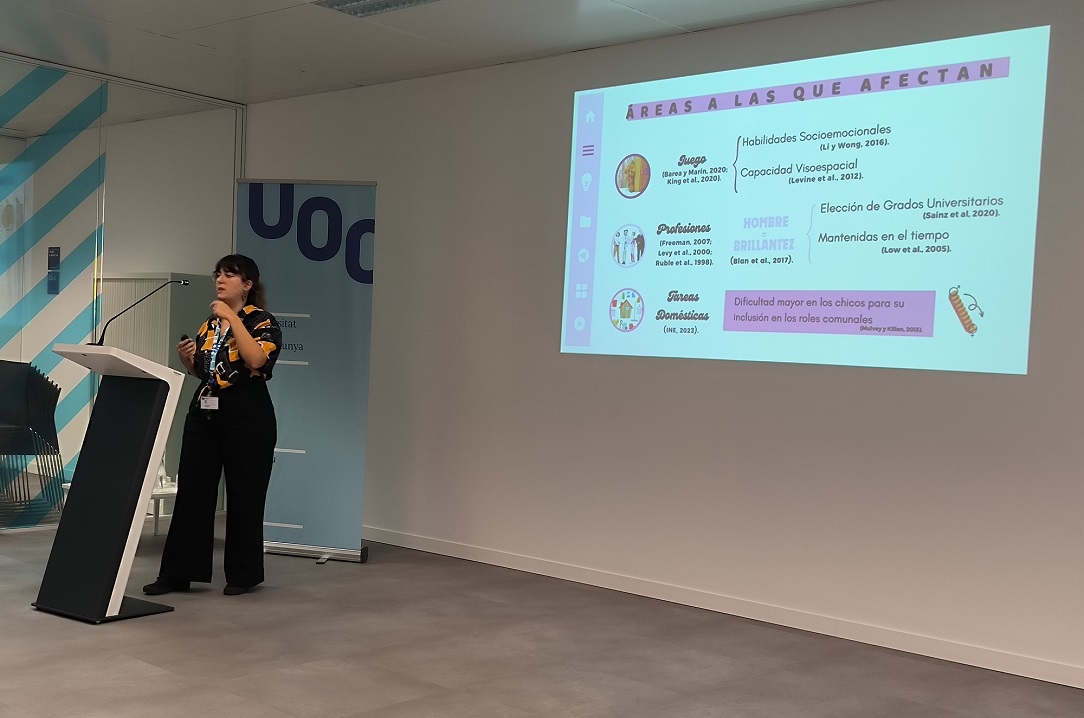
Rocío Segura, PhD candidate at GenTIC.
The first slot of the seminar concluded with a third presentation related to the the HORIGESTEM project by Miruna Bivol, a predoctoral researcher at GenTIC. Miruna Bivol shared the findings of a study based on a survey that involved 624 high school students, in which she analysed the differences in student well-being across school specializations in STEM and non-STEM disciplines in terms of gender, migrant background, and the intersection of both. The results show that girls experience higher levels of inadequacy and exhaustion compared to boys. Migrant boys show higher levels of cynicism compared to boys born in Spain. However, this aspect is reversed for girls: those born in Spain show higher levels of cynicism than migrant girls. In addition, girls show higher levels of depression than boys, with significant differences between students enrolled in humanities and social sciences. Miruna Bivol’s research also suggests that migrant students have higher levels of depression than their native peers. However, the intersection of gender and migrant background shows that migrant girls have the highest levels of depression compared to girls born in Spain, while among boys, Spanish-born boys have higher levels of depression compared to migrant boys. To conclude, Miruna Bivol discussed the implications of her findings and the importance of analysing different aspects of well-being among upper-secondary students, especially when they are making career-related decisions.
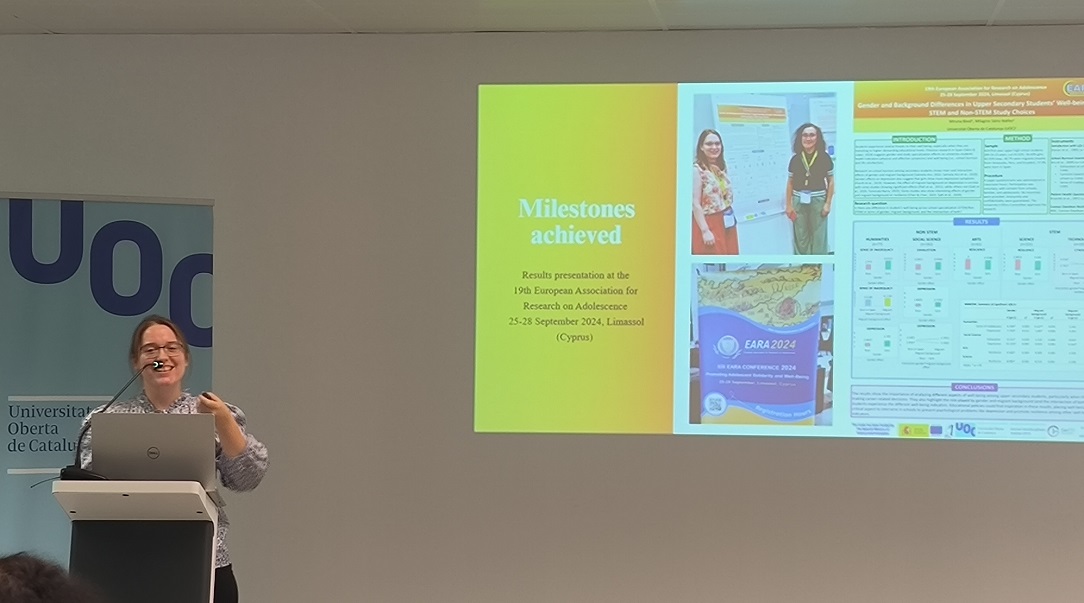
Miruna Bivol, PhD candidate at GenTIC.
The second slot of the seminar was moderated by Aran Romero Moreno, a postdoctoral researcher at GenTIC and project manager of INSPIRE. The slot began with a presentation by Rachel Palmén and Jörg Müller, senior researchers at GenTIC and members of the coordinating team of the INSPIRE project, funded by the European Union’s Horizon Europe program. Their presentation focused on a study conducted as part of the INSPIRE project, which analyses the facilitators and barriers to organizational change in higher education through several case studies. The researchers highlighted that inclusive Gender Equality Plans (GEPs) are the main tools promoted by the European Commission to address gender inequalities in research and innovation. However, we know little about the role of context and the interplay between national and organisational policies in the impact of GEPs. The case studies conducted by the INSPIRE project research team in different European higher education institutions examine how stakeholders within each organisation define and understand the success, failure and impact of GEPs, and what factors can be identified that facilitate or hinder the success of organisational interventions towards more inclusive gender equality.
The methodology consisted of a qualitative comparative analysis which explored a cross-case overview of six main factors for impact and organizational change: strategic organizational commitment, evidence-based reflexive approach, gendered knowledge, inclusive community of change agents, enforceable legislation, and supportive cultural and social context. One of the main insights of Jörg Müller and Rachel Palmén’s research pointed to the importance of implementation at the departmental level and the role of middle management figures in achieving change.
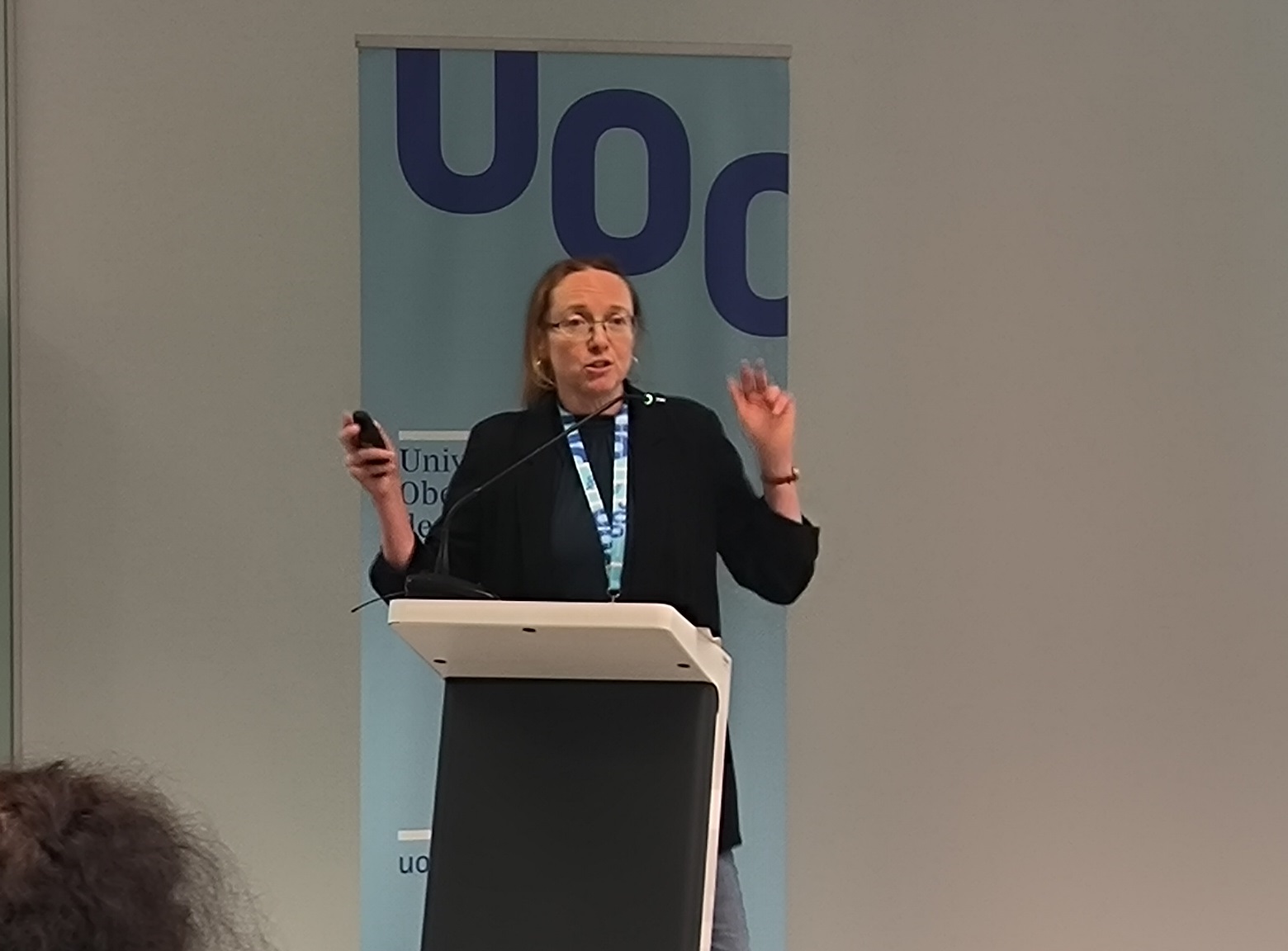
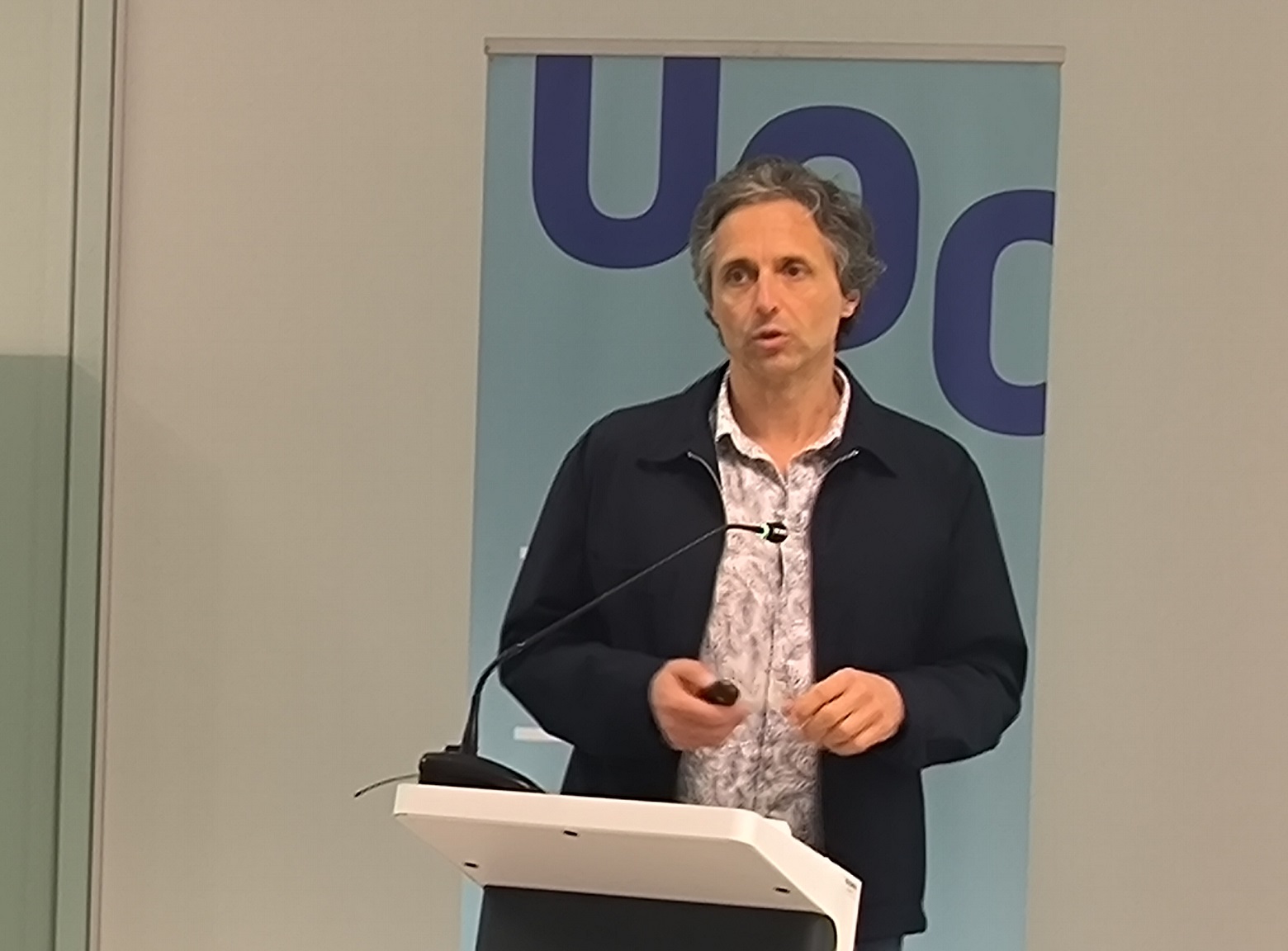
From left to right, Rachel Palmén and Jörg Müller, senior researchers at GenTIC and members of the INSPIRE project coordinating team.
The new representations of rural women in Catalonia and Spain on social media and in the media were the topic of María José Romano’s presentation, a research assistant at GenTIC. María José Romano shared the results of a joint research study with Enric Castelló, professor at the Universitat Rovira i Virgili and principal investigator of the Ruralim project. The study analysed the media and audiovisual productions of two groups of women shepherds and extensive livestock farmers, Ramaderes de Catalunya and Ganaderas en Red, and how their narratives, images, and political campaigns contribute to making visible the role of women in the agricultural and livestock sectors, confronting discrimination and stereotypes about gender and rurality, and promoting an eco-social change from an ecofeminist worldview. María José Romano highlighted that these social movements establish a new representation of rural women as active agents and drivers of innovation in the local economy and advocate for a triple revolution: feminist, ecological, and socioeconomic, from an intersectional perspective that interconnects gender, class, and place.
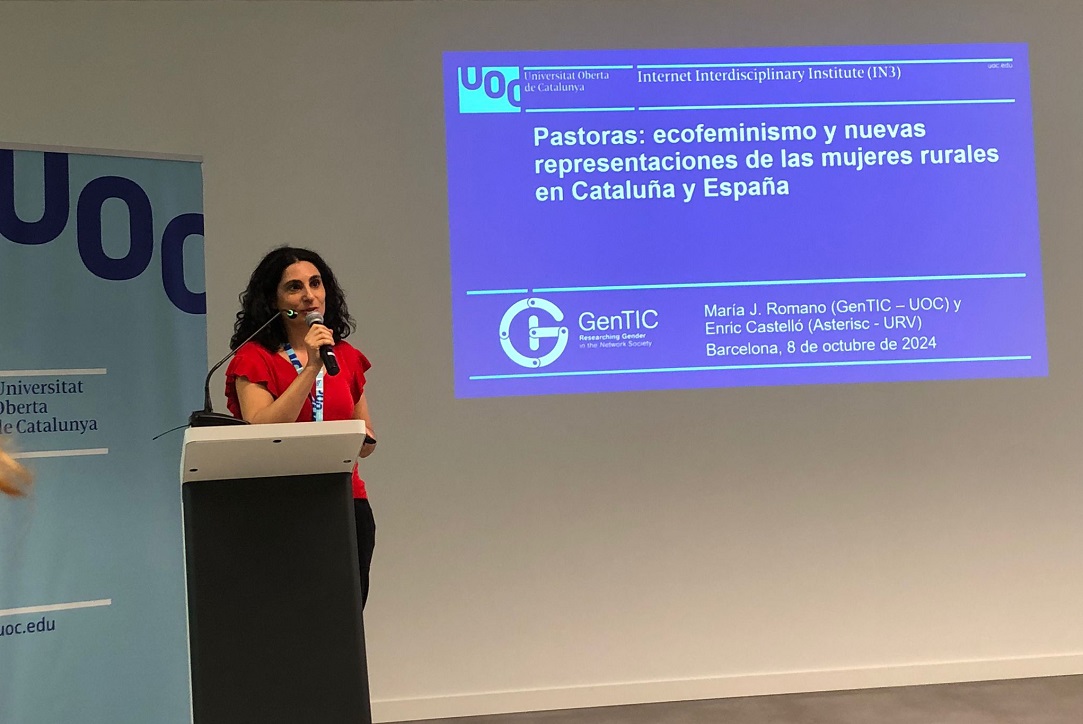
María José Romano, research assistant at GenTIC.
The research seminar concluded with presentations from two new postdoctoral researchers who have received Marie Sklodowska-Curie postdoctoral fellowships hosted by GenTIC. Ana Maria Noguera, who holds a degree in Performing Arts from the National Pedagogical University of Colombia and a PhD in Education and Cultural Studies from the Federal University of Rio Grande do Sul in Brazil, presented the project Indigenous women interconnecting knowledge: bodies, territories and technologies for life (INDIWOMINT). In the INDIWOMINT project, Ana Maria Noguera will study the relationship between indigenous women’s organizations in the Amazon and their connection with nature. The researcher examines how a decolonial ontological shift in the ways of producing and transmitting knowledge about sustainability can be crucial to addressing the current climate and social crisis.
To achieve this, she will map indigenous women’s organizations in the Amazon region of Brazil and document and analyse empirical data on indigenous practices and technologies that support traditional knowledge of cultural practices and agroecology. Finally, Ana Maria Noguera will create a guide of best practices for using indigenous knowledge and data in participatory processes and how to apply this knowledge to the challenges and opportunities of information and communication technologies (ICT).
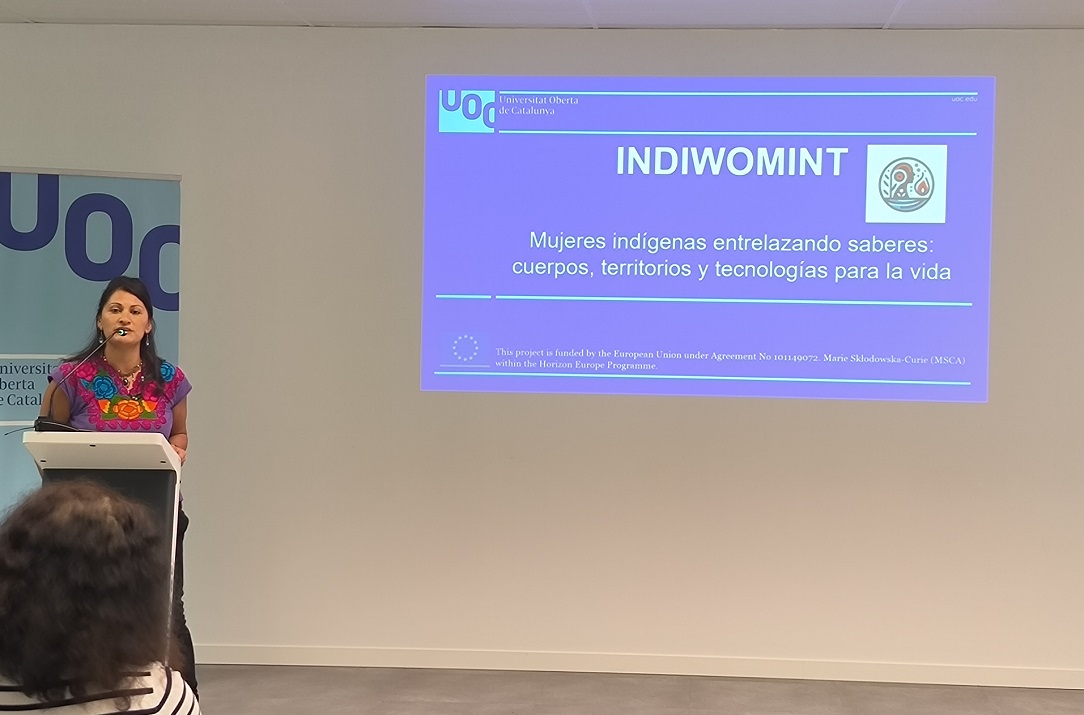
Ana María Noguera Durán, Marie Sklodowska-Curie postdoctoral researcher at GenTIC.
Luana Mathias Souto, who holds a PhD in Law from Pontifícia Universidade Católica de Minas Gerais – PUC Minas (Brazil), shared the objectives and work plan of her Marie Sklodowska-Curie project Reproductive Health Under Algorithm Surveillance (THELMA). THELMA focuses on Femtech end-user experiences and aims to map this industry and its applications, develop an impact pathways model, and outline a legal framework for user empowerment and social change. In addition, Luana Mathias Souto will develop open-access educational materials to inform women and people with a female reproductive system who desire to have or not have children, whether they are users of devices created by Femtechs or not, and who want to support their partners in their reproductive lives about the risks of sharing fertility data. You can follow the THELMA project activities and stay tuned for its scientific achievements in this blog.
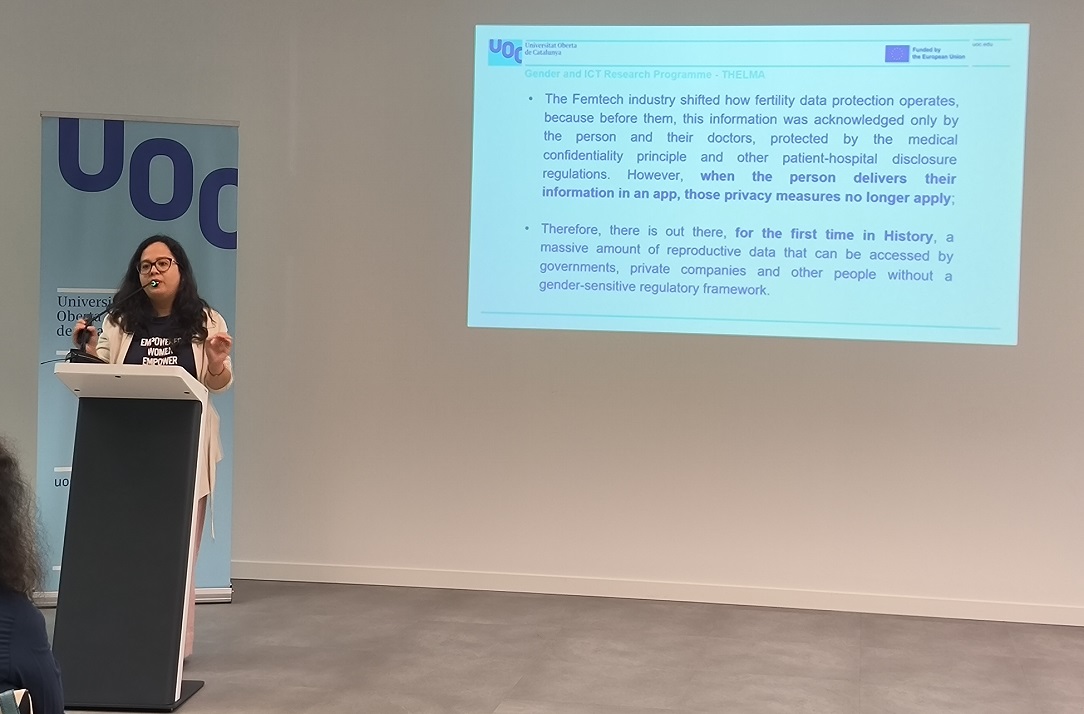
Luana Mathias Souto, Marie Sklodowska-Curie postdoctoral researcher at GenTIC.
The GenTIC team thanks everyone who attended the seminar, both in person and online, for their interest and thoughtful questions. We look forward to seeing you again in future editions of the #GenTICResearchSeminar.
